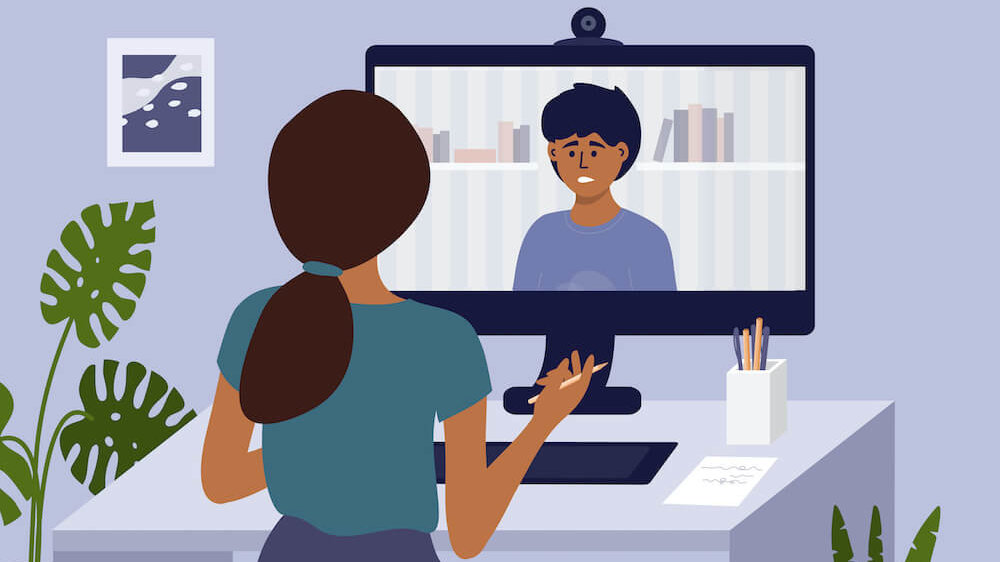
Trying to socialize both over Zoom and in-person during the pandemic is mentally — and physically — exhausting. Here’s why and what you can do about it.
The experience of remaining isolated or semi-isolated long-term during the COVID crisis has made socializing — whether physically distanced in-person or on a video chat — exhausting, noted The Cut’s senior health writer Katie Heaney. In a recent article, “I Forgot How to Hang Out,” Heaney shared how she, her wife, and her friends felt physically drained after a socially distanced meet-up at a park.
There is a physiological reason why socializing with others at the requisite distance of six feet apart (and with masks) is exhausting, she learned. When we communicate at a distance, we use more wind — and energy — to talk. “We have to project a lot more deliberately, and that’s exhausting for a long period of time,” University of Arizona communications professor Chris Segrin, Ph.D., told Heaney. On top of that, we are all trying our best to use interpersonal social skills that may have atrophied during lockdowns, making in-person interactions feel somewhat awkward, Heaney wrote.
Luckily, this is a temporary problem, Heaney wrote. Our social skills will return to normal as we have more opportunities for face-to-face interactions, much like regular exercise strengthens unused muscles. But Zoom and other video-chat platforms have created their own kind of socialization challenges that may not be so easy to shake as some companies opt to keep workers remote — and therefore professional interactions online — post-pandemic.
“There are a lot of things going on neurologically and biologically that make Zoom uniquely exhausting to your system,” journalist and We Need to Talk: How to Have Conversations That Matter author Celeste Headlee told Heaney. Zoom doesn’t allow for true eye contact, only the illusion of it, Headlee said. That’s because if you’re looking at your camera so it seems as if you are making eye contact with other participants, you can’t really see them. And if you are actually looking at them on screen, they can’t look you in the eye. Shifting between the two is “cognitively taxing,” she said.
In addition, our Zoom experience changes according to the size of the group. David Deming, Ph.D., economist and professor of public policy at the Harvard Kennedy School, told Heaney that once the number of participants in a Zoom call gets “above five or seven people, it starts to feel like a webinar, and that’s not at all similar to an in-person meeting.”
A recent study also found that other aspects of Zoom — like seeing ourselves onscreen, having reduced mobility, and working harder to communicate social signals that are more natural in person — also contribute to what we’ve come to recognize as Zoom fatigue.
Jeremy Bailenson, Ph.D., a professor of communication at Stanford University and author of the study, recommended a few ways to battle the mental exhaustion of excessive video chatting — including making the Zoom window smaller, placing yourself farther away from the computer, and hiding the self-view button. Turning the camera off completely at intervals — when appropriate — so you can move around freely can also help.
As noted in a recent The Philadelphia Inquirer article, COVID social restrictions have created a longing for us to experience “the broad spectrum of our humanness,” Thea Gallagher, a clinical psychologist and University of Pennsylvania assistant professor, wrote. She provided a few tips to help with feelings of isolation and frustration in finding social connection, like giving yourself credit for everything you are doing and writing it down at the end of the day, going outside for fresh air to lift your spirits, and such common-sense habits as eating regular meals, exercising, and getting enough sleep.
Finally, Gallagher said, seek help if you need it. “Your mental health,” she wrote, “is as important as your physical health.”
Casey Gale is associate editor at Convene.
